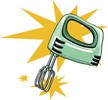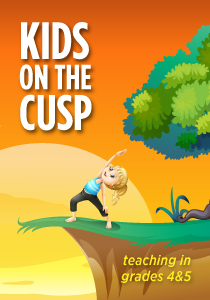How to Marinate a Rubric
A MiddleWeb Blog
I’m a word girl. When I write, I often find myself searching for the right word. When I read, I find myself stopping to marinate on a word, to consider its meaning more thoughtfully. That’s a skill I try to help develop in my students.
I’ve been grading my effectiveness of late, using the new rubrics the state has mandated. The state is trying to manage a very large group of trained professionals who have a strong voice and don’t always sit quietly in their seats. I imagine that it’s a difficult group to “manage.”
As I marinated on the content of these rubrics, I couldn’t help contemplating who should create the rubric that could be used as a tool to evaluate our state’s own management and efficiency. (I realize this particular method of evaluating our government’s performance could never be used in any official capacity, but it sure would be fun to write).
The second domain in the detailed set of rubrics used in the Kim Marshall Plan adopted by our district is entitled “Classroom Management” (it’s Rubric B in this PDF). The rubric asks us to consider the expectations we have for our students, the relationships we want to develop with them, the level of respect we exhibit toward them, and the awareness we have with regard to their social and emotional well-being. The state is asking us to perform in a responsible and efficient way, maintaining classroom order at all times. It’s a fair expectation of the people entrusted with children.
In this second domain I have been asked to rate myself according to my skill at managing a classroom. Merriam Webster defines the verb manage as “to handle or direct with a degree of skill; to make and keep compliant; to treat with care.”

My Word Girl persona strikes again, and she’s giving me a tough time as I try to self-assess using rubrics that contain many, many words and many opportunities for over-analysis. No matter, the state has decreed that I do this.
Domain B: Classroom Management
Let’s take a look. You can follow along on Rubric B and see how you might assess yourself (and the rubric, if you like):
(a) Expectations: My self-assessment in this subcategory seems to have started off well, with a rating of four. I am “direct, specific, and tenacious in communicating and enforcing high expectations.” I like the word tenacious. I’m not easily stopped and stand strong with regard to my students (this adjective applies to other aspects of my life, but I haven’t developed a formal rubric to evaluate those parts just yet).
(b) Relationships: I rated myself as efficient in this area. The top rating had the words all students with regard to building strong relationships. I enjoy visits from former students on a fairly regular basis. I was asked to serve as an advisor for an eighth grade Girl Scout Independent Project and recently helped one of my crew (from my first year as a teacher) get a little work as a starving writer. I do my best to “show warmth, caring, respect, and fairness” to all, as it states in the rubric, but once in a while, the need for “classroom management” steps in (that enforcing word), and someone’s feelings get hurt. I would probably only score a three in patience if it was a subcategory within this Relationships subcategory. We all have our moments.
(c) Respect: In order to earn the highest rating in this area, I need to “Win all students’ respect and create a climate in which disruption is unthinkable.” I’ll happily accept a scoring of three in this area. Disruption unthinkable? I actually choose to throw in a little disorder from time to time, to interrupt the normal course of our day. Ya’ gotta mix it up to keep ‘em interested!
(d) Social-Emotional: If I am efficient in this area, I “foster positive interactions.” If I am highly efficient, I “successfully develop positive interactions and social-emotional skills.” I think this is referring to those non-cognitive skills I was analyzing in the first of Marshall’s rubric domains: Planning and Preparation for Learning.

(f) Responsibility: Now there is a word whose meaning I have pondered often. When broken down, it simply means “able to respond.” Marshall’s highly effective rating in this subcategory says I should “Get all students to be self-disciplined and take responsibility for their actions.” It says they all must be “able to respond” to school, learning and life in an appropriate manner. I gave myself a three on this one, but now that I’m looking at it again, I think I am closer to “Tries to train students in class routines, but many of the routines not maintained.” That’s a two. Actually, we choose not to maintain a lot of them when they don’t work for our particular group dynamic.
(g) Repertoire: Now there’s another great word. It’s so French! I gave myself a three in this. You need to be able to “capture and hold students’ attention….” A four says I have to be able to do this “any time.” I do have the ability to raise one eyebrow. The kids notice. It can be a good thing or a bad thing in their eyes, but it captures their attention when wielded appropriately. The three says I have “moves” in my repertoire; I guess the eyebrow trick is more of a “move” than the “highly effective discipline repertoire” described in the characteristics of a four rating. I still really like the word repertoire, though.

(i) Prevention: Anyone who is “alert, poised, dynamic, and self-assured and nips virtually all discipline problems in the bud” deserves the four here. I tend to think that if you take the time to get to know the kids better, to talk with them, to try to listen to them, they don’t tend to act out too often.” Maybe it’s just the eyebrow.
(j) Incentives: The highest rating in this category asks us to “Get students to buy into” their learning by linking incentives to intrinsic rewards. Maybe I just don’t like the phrase “buy into.” It sounds like we’re selling them something. I get the point, the need for us to do our best to instill values in our students. I get that we want to help them develop character. But, if we have to get them to “buy into it,” is it truly intrinsic? I awarded myself a three. It says I “encourage and reinforce student cooperation.” I think that’s all we can do.
Next: Domain C – Delivery of Instruction. Feel free to peek ahead. Repertoire again!
































My personal favorite is C-UNTHINKABLE! Our students should not be disruptive in class-but it shouldn’t even enter their minds! And maybe we should add that we should be a bit clairvoyant in the process too. Well said, my friend.